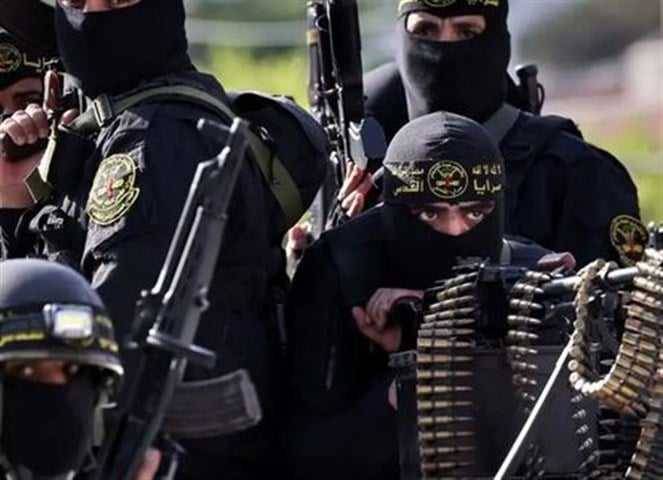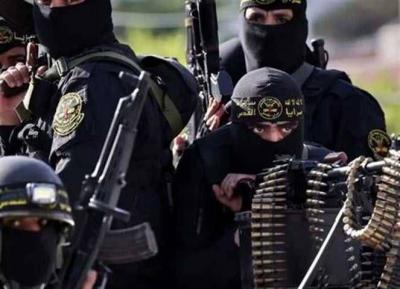The military activities of five Lebanese and Palestinian factions on the southern front raise political concerns in Lebanon regarding the post-war phase, as the country faces the challenge of disarming resistance factions that have acquired heavy weaponry. This development follows Hezbollah's initiative to open a support front for Gaza from southern Lebanon, as reported by "Asharq Al-Awsat".
While small arms have traditionally been held by Lebanese citizens since the civil war, heavy weapons like Katyusha rockets, mortars, and guided missiles are now in the hands of Hezbollah fighters, Amal movement, the Islamic group, as well as the Al-Qassam Brigades, which is the military wing of Hamas, and the Palestinian Islamic Jihad. Consequently, the issue of heavy armament is no longer solely confined to Hezbollah, making the phenomenon alarming, according to political officials. This concern was highlighted in statements made last Sunday following the funeral of two members of the Islamic group who were targeted by an Israeli drone.
#### Five Factions
While the factions remain tight-lipped about the sources of their weapons, security estimates suggest that arms are being acquired through illegal crossings and from illegal arms markets around the world. After Hezbollah confirmed it has one hundred thousand fighters and Israeli estimates suggested it has 150,000 rockets, other estimates indicate that the number of fighters among other factions ranges from dozens to hundreds.
The Amal movement, which has buried 17 of its members since the war began, declares its presence in every border village in the south, asserting that fighters are local residents defending their towns against attacks. Meanwhile, the Islamic group has mourned five fighters since the onset of the war, and the Islamic Medical Association, associated with the Islamic group, reported seven medics killed by an Israeli airstrike targeting their base in Al-Habbariyeh. Field sources state that the Islamic group maintains a presence in the Arqoub area, populated mostly by Sunnis.
On the Palestinian side, there are no official estimates regarding the number of fighters or how they possess weapons, although close allies of Fatah suggest that there are dozens and that the recently surfaced weapons (rockets) are not from arsenals previously held by Palestinian resistance factions in Lebanon, but rather acquired from Hezbollah or through illegal smuggling routes.
#### Deferred Discussions
Despite the concerns regarding this phenomenon and questions about how to address it post-war, this issue has not yet been politically discussed among parties and political forces, according to parliamentary sources following the growing trend. They note that none of the political forces have a plan for how to deal with this newly emerged reality in the future.
Lebanon previously suffered from the chaos of weapon possession during the Lebanese civil war (1975-1990), which only ended with a political agreement following the National Accord Document in Taif in 1989, where various militias handed over their weapons to the Lebanese army, except for Hezbollah and other resistance factions allowed to keep weapons to resist Israel, which occupied parts of southern Lebanon until its withdrawal in 2000. Heavy weapons remained solely in Hezbollah’s possession thereafter, while individuals and party supporters kept personal firearms.
#### Political Bargain
Lebanese concerns extend beyond the phenomenon of arming and the proliferation of resistance factions in the recent war conditions to political fears for the time ahead. Member of the Change Bloc, MP Ibrahim Mneimneh, rejects legitimizing the culture of accepting arms outside the state, along with narratives that reinforce precedents established by the presence of Hezbollah's weapons outside legality. He notes that the laxity of security forces has led to the proliferation of this phenomenon in recent times.
Mneimneh emphasizes to "Asharq Al-Awsat" that the monopoly of arms should be in the hands of the state, as stated in the Lebanese constitution and the Taif Agreement, which serves as a national roadmap, urging against portraying the issue as a political bargain for disarming. He states that he rejects the exploitation of arms to impose new political equations, referencing the experiences of the Lebanese civil war that Lebanon has not yet overcome.
#### Defensive Strategy
The idea of discussing a defensive strategy for Lebanon was previously raised, with Hezbollah advocating this direction, although it has faced differing visions regarding its nature between the party and its opponents. While Mneimneh does not deny that there is a concern among some Lebanese regarding Israeli aggression and the desire to protect Lebanon within the defensive strategy, he stresses the need to return to the dialogue table to discuss it.
He specifies that this strategy should not be confined only to weapons and elaborates that military preparedness is part of various levels that can be worked on to provide protection for Lebanon. He adds that in discussing the defensive strategy, capabilities across all levels should be defined, and the Lebanese legitimate authority should oversee its implementation, in accordance with the constitution. He insists on the necessity of gathering around the table to discuss all options under the auspices of the state and legitimate institutions and that the strategy should encompass all elements to establish a policy for protecting and defending Lebanon under state authority.
#### Constitutional Treatment
Former Deputy Speaker of Parliament Elie Ferzli does not view this phenomenon as new, recalling that during the Syrian war, arms were present and circulated back and forth across the Syrian border for all parties, using Lebanon as a passage during that time. However, he does not deny that the phenomenon of all Lebanese forces possessing arms outside state control is concerning.
He states: "It is clear that a strategic relationship has emerged today between Hezbollah and other forces fighting to alleviate pressures on the Palestinians," and emphasizes that theoretically, no party can claim it is uninvolved in addressing the issue of arms proliferation, which requires a return to the Lebanese constitution for resolution, instead of contemplating undermining it.




